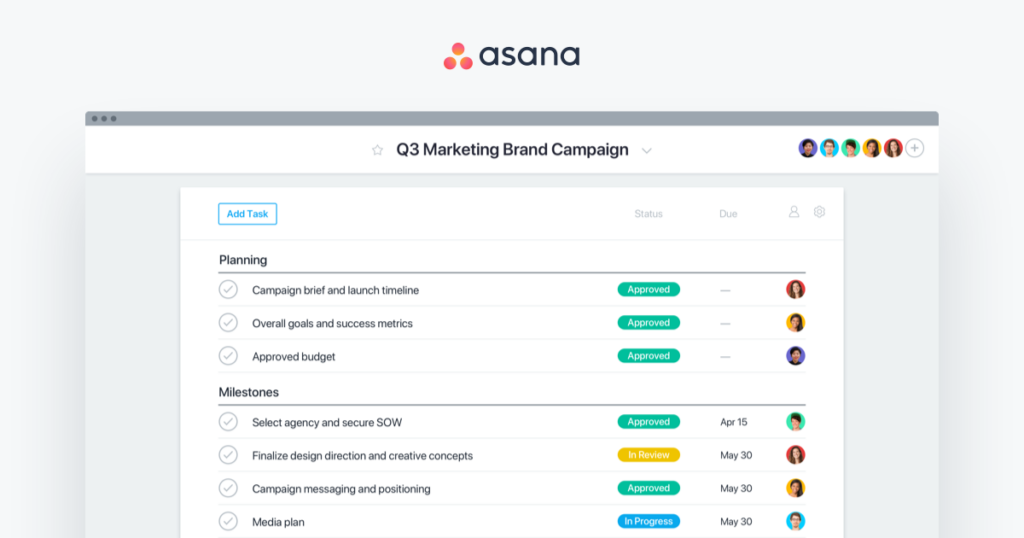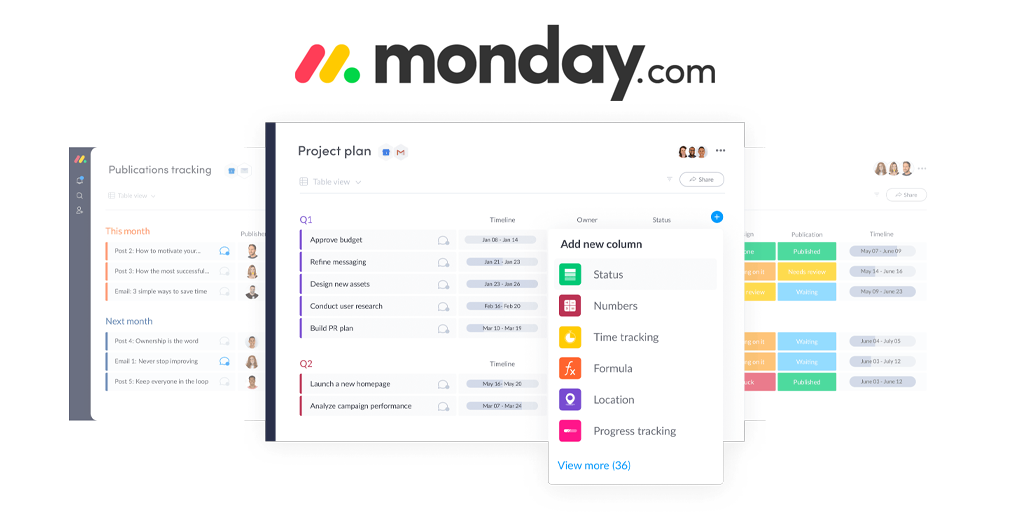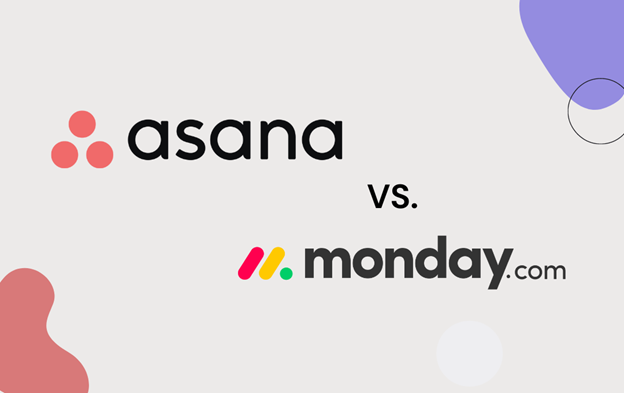Asana vs Monday: Which Is Best & What’s the Difference? When you buy project management software, you would like to make sure it can handle the workflow of work at your business. In this area, both Asana vs Monday.com have their good points, but Asana wins out in the end. Its platform is easy to use and has everything you need to manage your company smoothly.
There are a lot of different kinds of project management software Asana vs Monday on the market. How do you choose the one that works best for your business? Whether you are managing a small company or a multimillion-dollar project, the right software can help you organise your projects, manage your schedules, and hire and manage your employees. You will also be able to look at any progress on the project reports if you need to.
This “Asana vs Monday” article will help you choose between the two most popular project management programs for your business. All the people on a team working on a project should have a great time managing it, right? If the software is well managed, you should be able to be more involved in the project as a leader. This means that the team will have more management in Asana vs Monday.
Asana rebel can help you build a better team, save time, and grow your business if you need a complete project management solution.
What is Asana?

Asana is project management software for startups and small- and medium-sized businesses. It was started in 2008 by people who used to work for Facebook. Its goal was to make it easier to keep track of work by offering a single place to create projects, assign and manage tasks, collaborate, manage portfolios, and manage workflows.
Asana rebel is a good choice for agile project management because it has a lot more features than other tools. This project management software lets you use different styles of management, such as Gantt charts, task lists, and Kanban boards. It gives team members a central place to talk to each other. This gets rid of the back-and-forth emails, making it easier for team members to work together and for you to run your group more efficiently, which increases productivity.
What is Monday?

Project management software Monday software has been around since 2012, and businesses of all sizes, from startups to well-established businesses, use it. It can be used in different ways to help multiple teams in the same organization reach their goals. For example, the sales team can use it to build a crm software monday to improve sales processes, the development teams can use it to track bugs, and the marketing people can use it to plan and improve campaigns.
It comes with more than 200 workflow templates, or each team can make its own from scratch. CRM Monday.com comes with workflow templates that are easy to change to fit the needs of your project. By automating key administrative tasks, it helps you do less work by hand. You can also connect other tools to CRM Monday.com to make project management easier. The set of Asana vs Monday features lets users put every step of project management in one place and make the process more open and productive by making it easier for team members to work together.
Differences Between Asana vs Monday
If you want to use CRM Monday.com’s integration features, you have to choose the Standard or higher plan.With the Standard plan, you can perform up to 250 integration actions per month. If you want to integrate with Gmail or Outlook, choose the Pro or Enterprise plans, which let you do enough actions per month.
On the other hand, Asana’s free plan lets you connect more than 100 of your favorite tools, such as Microsoft Teams, Slack, Jira Software as a Service, Microsoft Office 365, Gmail, and more. So, Asana is once again the better choice.
#1. Automation
With Monday’s Standard plan, you can use up to 250 actions to automate things. We suggest this plan to people who use automation once in a while. The Pro plan, on the other hand, lets you automate up to 250,000 actions. So, it’s good for people who need automation features they can use every day. Asana also has features for automating tasks. You can use the gallery of pre-set rules to choose the automation feature you want, or you can use the “Custom Rules Builder” to make your own automation rules.
#2. Tracking the time
The time-tracking feature on Monday.com lets you keep track of how long you spend on each task. Asana doesn’t have a built-in way to track time. For this feature to work, you can connect it to other platforms.
#3. Help for customers
Monday.com has customer service that is open all the time. You can get help via email, a forum (FAQs), a knowledge base, the phone, and chat. Asana’s customer service can be reached by email, chat, a knowledge base, and a forum with frequently asked questions.
#4. Security
Since it has ISO/IEC 27001 and ISO/IEC 27018 certifications, monday.com can store all of your information safely in the cloud. Asana also promises that your personal information will be safe. All of your data has been approved by ISO/IEC 27001:2013.
#5. Suitable for
Monday.com is good for both small and large businesses and people. It has a simple, easy-to-understand interface and a lot of helpful tools for managing projects. Asana is also a useful tool for all sizes of businesses, but it can be expensive for small ones. But the features you get are well worth the money you pay for them.
#6. User Experience
Maybe the fact that the services don’t have all the bells and whistles of more advanced project management apps helps them in this way. Both are so easy to use. Each has a clean, quick, and responsive user interface. In each case, the color-coded design is not only pretty, but it also makes it easy to use the different boards, task lists, menu search, and other things.
#7. Templates
CRM software monday has more than 200 customizable, pre-built templates that you can use to finish tasks quickly. Asana allows you to use task templates with some of its premium and higher plans.
#8. Project view
CRM Monday.com lets you make as many boards as you want to keep track of your tasks, projects, processes, and clients. You can also use different kinds of columns to make your boards look the way you want. Gantt charts can help you keep track of when things need to be done. A visual timeline can show you what you need to do next. A visual calendar lets you manage your tasks. CRM Monday.com also lets you look at your data as charts and graphs and gives you statistical insights about your work based on the boards you make. You can see your projects on Asana as a list or a board. The calendar view lets you keep track of what you have to do.
#9. Use-friendly
Software for both platforms is said to be easy to use. Users say that Monday.com is easier to use and has a more modern-looking interface than Asana.
Asana vs Monday: Pricing
Both software options are a little pricey, so this was hard. But one choice has a pricing structure that is easy for buyers to understand.
Monday.com Pricing
The prices for Monday.com are a little more complicated than those for most project management software. Monday.com does things a little bit differently. Instead of offering a few tiers and pricing the software based on how many users it has, it uses a different method.
Its price levels are divided into four groups:
- Basic: features include unlimited project viewers, unlimited boards, iOS and Android apps, a 5 GB file storage limit, a 1-week limit on activity logs, and a 1-dashboard limit.
- Standard: All of the above, plus 50 GB of file storage, unlimited activity logs, 4 guest accounts, a timeline view, a calendar view, advanced search, custom forms, access to integrations, and a maximum of 3 dashboards.
- Pro: All of the above, plus unlimited data storage, unlimited guest accounts, time tracking, chart views, formula columns, private boards, and 10 dashboards.
- Enterprise: All of the above, plus 25 dashboards, audit logs, user session management, new account permissions, more training, and a dedicated account success manager.
Each tier is, of course, more expensive than the one before it. However, the prices don’t stop there. Monday.com also breaks down its prices by the number of users in nine different ways. When you add more features and users to Monday.com, the cost goes up quickly. This is not the most expensive project management tool I’ve seen, but it isn’t the cheapest either.
Asana Pricing
Asana’s prices are also kind of high.It starts with a free plan for up to 15 users, which is a good thing. Its free version has a lot of features that you would have to pay for with other project management tools. But if you want to use the features that make Asana special, like timelines, monitoring your workload, and portfolios, you’ll have to pull out your wallet.
The way Asana charges per user per month isn’t cheap:
- Basic: is free and has up to 15 users, task lists, Kanban boards, calendars, and app integrations.
- Premium: which costs $9.99 per user per month with an annual contract, has all of the features above plus timelines, advanced searches, and the ability to create custom fields.
- With an annual contract, Business costs $19.99 per user per month and includes all of the above features, as well as portfolios, workload, forms, automatic proofing, and Adobe Creative Cloud integration.
- Enterprise: The pricing that was worked out with the client includes all of the above features plus user provisioning, data exporting, custom branding, and priority support.
Which is better for you: Asana or Monday?
Even though they are both similar, they are different because of the features they have and how flexible they are. And this is where project managers have to be clear. It’s all about finding a balance between what you need and what you’re ready to spend. You can try out each tool before you buy it, which is a big help. It never hurts to give something a try. It is important to choose the one you like best. No matter which choice you make, you will be able to integrate. With these connections set up, you can automatically turn form responses into tasks, projects, or subtasks.
Final Words
Asana and Monday are both tools for managing projects, but they are used in different fields and for different reasons. But what makes them different are the features they offer and how you can access and use those features to improve your project management work. This article looks at the features of these two project management platforms to help you decide which one is best for your project management organization.
Asana vs. Monday: Both of these are good project management software, but in different ways that help a lot depending on the industry and the goal of the project. If you’re working on a small scale, Asana can make you feel more at ease because it gives you a place to do your work and keep track of your tasks. With this software, you can be more efficient in your workflow and have all the essential tools at your fingertips. But if you are working on a large scale, CRM software monday is a better choice because it has more efficient workspaces, tools for teamwork, and enterprise features.
Frequently Asked Questions
What doesn’t Asana have that Monday.com does?
Monday.com has Gantt, Map, Chart, and Workload views, as well as whiteboards and documents that are embedded, but Asana doesn’t. Monday also has more than 200 templates, while Asana has only 50.
Asana vs monday? Which is better for integrating projects?
Each has pros and cons, so it’s hard to say which is better.Both services offer a wide range of features, but some people may find that one is better for certain tasks than the other.Many people like to use Monday for work projects and Asana for personal ones.
Does Monday.com help freelancers?
Yes, it can be a very useful tool for people who work on their own.It even has a version that is free.Even the paid plans don’t cost too much. It is a modern, smart, and easy-to-use tool for managing work that can be used by both individuals and businesses.
Is there a free trial for Monday or Asana?
Monday has a free trial, but Asana does not. But you can start using Asana for free, and your first $5/month payment is due on Monday.
Are Asana and Monday similar?
Asana is project management software that was first made by CEO Dustin Moskovitz for his own use. It is used for project management, collaboration, communication, and management workflow. On the other hand, Monday is a task manager that is easy to use and has recurring tasks and projects. It was made by David Matteson to help him keep track of his responsibilities.
Can just one person use Monday.com?
Because Monday.com is easy to use and easy to set up, you can use it on your own. Use the Basic plan if you want simple tools for managing your work. You can get the basic plan for free. It also offers customer service via email, a forum (FAQs), a knowledge base, the phone, and chat 24 hours a day, 7 days a week. So, you can get help at any time from the support team.
Does Monday cost less than Asana?
Monday costs more than Asana. Asana’s free version, on the other hand, has more features than Monday’s free version. But Asana’s paid plans start at $13.49 per month per user, while CRM software monday’s start at $8 per month per user.

